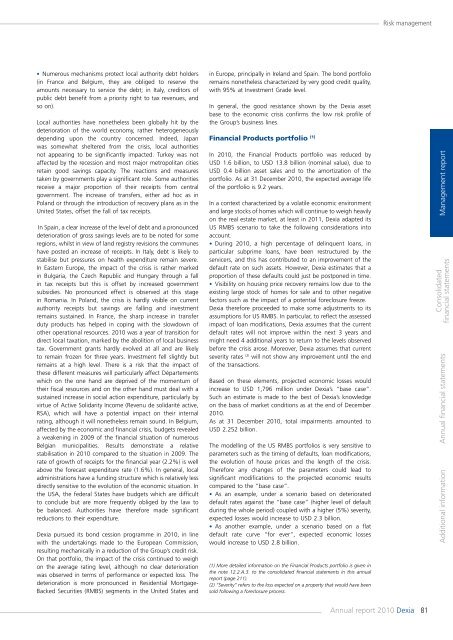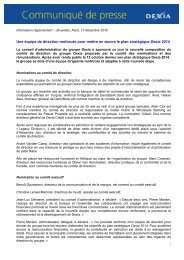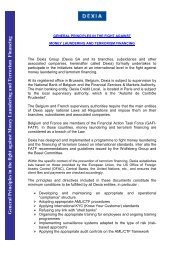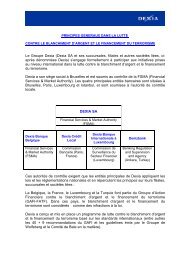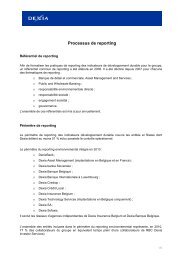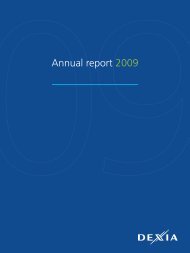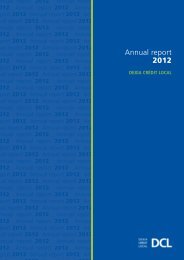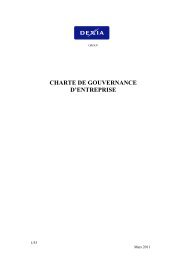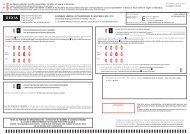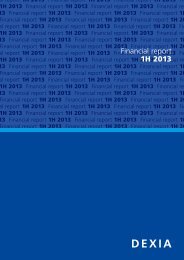Annual report 2010 - Dexia.com
Annual report 2010 - Dexia.com
Annual report 2010 - Dexia.com
- No tags were found...
You also want an ePaper? Increase the reach of your titles
YUMPU automatically turns print PDFs into web optimized ePapers that Google loves.
Risk management• Numerous mechanisms protect local authority debt holders(in France and Belgium, they are obliged to reserve theamounts necessary to service the debt; in Italy, creditors ofpublic debt benefit from a priority right to tax revenues, andso on).Local authorities have nonetheless been globally hit by thedeterioration of the world economy, rather heterogeneouslydepending upon the country concerned. Indeed, Japanwas somewhat sheltered from the crisis, local authoritiesnot appearing to be significantly impacted. Turkey was notaffected by the recession and most major metropolitan citiesretain good savings capacity. The reactions and measurestaken by governments play a significant role. Some authoritiesreceive a major proportion of their receipts from centralgovernment. The increase of transfers, either ad hoc as inPoland or through the introduction of recovery plans as in theUnited States, offset the fall of tax receipts.In Spain, a clear increase of the level of debt and a pronounceddeterioration of gross savings levels are to be noted for someregions, whilst in view of land registry revisions the <strong>com</strong>muneshave posted an increase of receipts. In Italy, debt is likely tostabilise but pressures on health expenditure remain severe.In Eastern Europe, the impact of the crisis is rather markedin Bulgaria, the Czech Republic and Hungary through a fallin tax receipts but this is offset by increased governmentsubsidies. No pronounced effect is observed at this stagein Romania. In Poland, the crisis is hardly visible on currentauthority receipts but savings are falling and investmentremains sustained. In France, the sharp increase in transferduty products has helped in coping with the slowdown ofother operational resources. <strong>2010</strong> was a year of transition fordirect local taxation, marked by the abolition of local businesstax. Government grants hardly evolved at all and are likelyto remain frozen for three years. Investment fell slightly butremains at a high level. There is a risk that the impact ofthese different measures will particularly affect Départementswhich on the one hand are deprived of the momentum oftheir fiscal resources and on the other hand must deal with asustained increase in social action expenditure, particularly byvirtue of Active Solidarity In<strong>com</strong>e (Revenu de solidarité active,RSA), which will have a potential impact on their internalrating, although it will nonetheless remain sound. In Belgium,affected by the economic and financial crisis, budgets revealeda weakening in 2009 of the financial situation of numerousBelgian municipalities. Results demonstrate a relativestabilisation in <strong>2010</strong> <strong>com</strong>pared to the situation in 2009. Therate of growth of receipts for the financial year (2.2%) is wellabove the forecast expenditure rate (1.6%). In general, localadministrations have a funding structure which is relatively lessdirectly sensitive to the evolution of the economic situation. Inthe USA, the federal States have budgets which are difficultto conclude but are more frequently obliged by the law tobe balanced. Authorities have therefore made significantreductions to their expenditure.<strong>Dexia</strong> pursued its bond cession programme in <strong>2010</strong>, in linewith the undertakings made to the European Commission,resulting mechanically in a reduction of the Group’s credit risk.On that portfolio, the impact of the crisis continued to weighon the average rating level, although no clear deteriorationwas observed in terms of performance or expected loss. Thedeterioration is more pronounced in Residential Mortgage-Backed Securities (RMBS) segments in the United States andin Europe, principally in Ireland and Spain. The bond portfolioremains nonetheless characterized by very good credit quality,with 95% at Investment Grade level.In general, the good resistance shown by the <strong>Dexia</strong> assetbase to the economic crisis confirms the low risk profile ofthe Group’s business lines.Financial Products portfolio (1)In <strong>2010</strong>, the Financial Products portfolio was reduced byUSD 1.6 billion, to USD 13.8 billion (nominal value), due toUSD 0.4 billion asset sales and to the amortization of theportfolio. As at 31 December <strong>2010</strong>, the expected average lifeof the portfolio is 9.2 years.In a context characterized by a volatile economic environmentand large stocks of homes which will continue to weigh heavilyon the real estate market, at least in 2011, <strong>Dexia</strong> adapted itsUS RMBS scenario to take the following considerations intoaccount.• During <strong>2010</strong>, a high percentage of delinquent loans, inparticular subprime loans, have been restructured by theservicers, and this has contributed to an improvement of thedefault rate on such assets. However, <strong>Dexia</strong> estimates that aproportion of these defaults could just be postponed in time.• Visibility on housing price recovery remains low due to theexisting large stock of homes for sale and to other negativefactors such as the impact of a potential foreclosure freeze.<strong>Dexia</strong> therefore proceeded to make some adjustments to itsassumptions for US RMBS. In particular, to reflect the assessedimpact of loan modifications, <strong>Dexia</strong> assumes that the currentdefault rates will not improve within the next 3 years andmight need 4 additional years to return to the levels observedbefore the crisis arose. Moreover, <strong>Dexia</strong> assumes that currentseverity rates (2) will not show any improvement until the endof the transactions.Based on these elements, projected economic losses wouldincrease to USD 1,796 million under <strong>Dexia</strong>’s “base case”.Such an estimate is made to the best of <strong>Dexia</strong>’s knowledgeon the basis of market conditions as at the end of December<strong>2010</strong>.As at 31 December <strong>2010</strong>, total impairments amounted toUSD 2.252 billion.The modelling of the US RMBS portfolios is very sensitive toparameters such as the timing of defaults, loan modifications,the evolution of house prices and the length of the crisis.Therefore any changes of the parameters could lead tosignificant modifications to the projected economic results<strong>com</strong>pared to the “base case”.• As an example, under a scenario based on deteriorateddefault rates against the “base case” (higher level of defaultduring the whole period) coupled with a higher (5%) severity,expected losses would increase to USD 2.3 billion.• As another example, under a scenario based on a flatdefault rate curve “for ever”, expected economic losseswould increase to USD 2.8 billion.(1) More detailed information on the Financial Products portfolio is given inthe note 12.2.A.3. to the consolidated financial statements in this annual<strong>report</strong> (page 211).(2) “Severity” refers to the loss expected on a property that would have beensold following a foreclosure process.Management <strong>report</strong>Consolidatedfinancial statementsAdditional information <strong>Annual</strong> financial statements<strong>Annual</strong> <strong>report</strong> <strong>2010</strong> <strong>Dexia</strong>81


